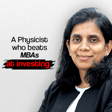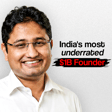
A Masterclass on Product-Market Fit & Hyper-Growth | Karan Bajaj (WhiteHat Jr.)
"Money follows a very simple mathematical formula. Its magnitude multiplied by impact."
This is the beautifully simple principle that Karan Bajaj landed on after years of searching for a path to financial independence. It cuts through the noise of online gurus and get-rich-quick schemes, arguing that true wealth is a direct byproduct of creating deep and wide-ranging value for people.
In this episode, host Akshay Datt sits down with Karan Bajaj, the founder of WhiteHat Jr. and a bestselling novelist. In just 18 months, Karan built his ed-tech startup to a staggering:
$150 million annual revenue run rate before its landmark
$300 million all-cash acquisition by BYJU'S —a deal that personally netted him an estimated
$120 million.
Before his explosive entrepreneurial journey, he published
4 novels with major houses like Penguin Random House and HarperCollins and led a corporate life as the CEO of Discovery Networks for South Asia.
Key Insights from the Conversation:- The "50-50-50" Rule: Karan reveals his strict criteria for product-market fit before scaling: achieving a 50% Net Promoter Score, a 50% renewal rate, and 50% of new revenue from referrals.
- Willful Poverty: To break free from financial anxiety, he practiced "willful poverty," taking a year-long sabbatical to travel from Europe to India by road on a barebones budget, a phase that gave him the courage to take bigger risks.
- The Blitzscaling Playbook: The conversation unpacks the engine behind WhiteHat Jr.'s hyper-growth, which was remarkably focused on just two channels: Facebook advertising and referrals.
- From Founder to Politician: Karan shares his next ambitious goal: to enter Indian politics and apply his learnings in scaling systems and operations to public service.
- "The Yogi and the CEO": The discussion explores the central duality of Karan's identity—the mindful, introspective novelist and the aggressive, impatient startup founder.
(00:00) The "Yogi CEO": Balancing a corporate career with spiritual sabbaticals.
(01:22) The Power of Willful Poverty: How living with nothing gives you the freedom to risk everything.
(16:41) The 4% Rule: The mathematical formula for financial independence that sparked the startup journey.
(28:05) The WhiteHat Jr. Idea: Why coding for kids was a "blue ocean" opportunity.
(33:51) From Zero to One: How to build an MVP and get your first paying customer in 4 weeks.
(48:43) The "50-50-50" Rule: The 3 metrics you MUST hit before scaling your startup.
(57:50) The Blitzscaling Playbook: How we doubled revenue every month.
(1:18:19) The $300M BYJU'S Exit: The logic behind selling a rocketship startup in just 18 months. (1:23:47) The "Wolf Gupta" Controversy: Lessons from a marketing campaign that went too far.
(1:24:08) What's Next: From founder & CEO to a new life in politics.
Hashtags:#founderthesis #karanbajaj #whitehatjr #startupindia #entrepreneurship #founderstories #akshaydatt #businesspodcast #scaling #venturecapital #edtech #byjus #exitstrategy #blitzscaling #productmarketfit



















